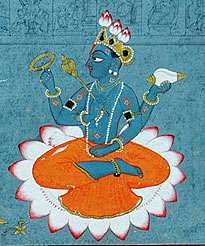Vedanta Desika
| Sri Vedanta Desikan | |
|---|---|
 Swamy Sri Vedanta Desikan as in Kanchipuram with lions on two sides | |
| Born |
Venkatanathan 1268 AD Thoopul (Thiruthanka) (present-day Kanchipuram District, Tamil Nadu, India) |
| Died | 1370 AD |
| Titles/honours | Sarvathanthra Swathanthrar, Kavitharkiga Simham, Vedanthachariar |
| Guru | Sri Kidambi Appullar alias Sri Aathreya Ramanujachariar |
| Philosophy | Ramanuja's Vishistadvaita |
| Literary works | Sri Sthothra Nidhi, Sri Paduka Sahasram, Rahasya Granthams, Sri Desika Prabandham, Kavyams |
| Quotation |
Srimathe Nigamantha Maha Desikaya Namah: (श्रीमते निगमान्त महादेशिकाय नमः) |
| Part of a series on | ||
| Hindu philosophy | ||
|---|---|---|
 | ||
| Orthodox | ||
|
|
||
| Heterodox | ||
|
|
||
|
||
| Part of a series on |
| Vaishnavism |
|---|
 |
|
Sampradayas |
|
Philosophers–acharyas |
|
Related traditions |
|
|
Vedanta Desika (Swami Desikan, Swami Vedanta Desikan, Thoopul Nigamaantha Desikan) (1268–1370) was a Sri Vaishnava guru and one of the most brilliant stalwarts of Sri Vaishnavism in the post-Ramanuja period. He was a poet, devotee, philosopher and master-teacher. He was the disciple of Kidambi Appullar, also known as Aathreya Ramanujachariar, who himself was of a master-disciple lineage that began with Ramanuja. Swami Vedanta Desika is considered to be avatar (incarnation) of the divine bell of Venkateswara of Tirumalai by the Vadakalai sect of Sri Vaishavites.
Salutation
In Sri Vaishnavism, a Thanian is a laudatory dedication in verse composed about an acharya by another acharya who is the subject's pupil and someone whom the subject greatly admired. The Thanian of Desika is:
"rAmAnuja-dayA-pAtraM j~nAna-vairAgya-bhUShaNaM |
shrImad-venkaTa-nAthAryaM vande vedAntadeshikaM ||"
This Thanian was composed by brahmatantraswatantra jeeyar of Parakala Mutt on the day of star of Hastham, the star of Varadharaja Perumal of Kanchipuram in the Tamil month of Avani. It is recited before starting Divya Prabandham[1] — the works of Alwars by Vadakalayars. It translates as "I salute the great Venkata Natha also called Vedanta Acharya and Lion among poets and logicians and who was well adorned by both Knowledge and discretion and who well deserved the grace of Athreya Ramanujar who also had the same name."
Vazhi Thirunamam
Vazhi Thirunamam is a set of salutary verses chanted in temples to mark the closure of the day's Divya Prabandha chanting. They are intended to ensure that these temples and the practices as established by the acharyas and Ramanuja will be followed for ever.
References
Further reading
- Sri Vedanta Desika: Makers of Indian Literature by M. Narasimhachary, Sahitya Academy, 2004.